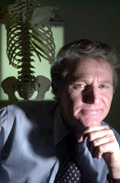Dr David McGrath
Spine Physician
MB BS (Hons) FAFOM, RACP, FAFMMMaster of Pain Medicine
Language is a cooperative recursive mutual disturbance mechanism for establishing effective actions within a social grouping. We usually think of language as words, either written or spoken. But words are themselves, disturbances, which have a specific effect within our bodies.
We can see this quite clearly, by comparing familiar words to the words of a foreign language.
1. When we hear familiar words, we are,drawn to action
2. When we hear, unfamiliar words, we are unmoved. They may be melodic,but there is no conation or emotion,to act.
Words or gestures, are incomplete disturbances, in that a further response, is needed to end the disturbance. In fact, one disturbance follows another until a terminating end. This can be classified as a series of questions or requests, until a final statement and action. A conversation is an alternating sequence of questions until the final statement, marking the end of that conversation. Each cycle of qestions, is a recursion, from the perspective of one individual involved.
This fact, is easily obscured, by competing questions,which gain access only,with the termination of a preceeding conversation. In other words, we live a series of conversations, punctuated with terminal statements, with hardly a break, and miss the changing emotions, associated with each conversation.
In fact, the whole process of mind is somewhat slippery. We are asking a continuous disturbance system of language,to convolute upon itself, and perceive its own process. This subject is tackled in the mind series of articles.
To return,to some basics.
1.Words are incomplete disturbances,requiring further action. That is why we "feel" them. A hand wave,is not the same as a beckoning sign (word). A smile is not the same as a pointing finger (word). The word "come ?" (word) is not the same as "xyz". Words engender a specific emotion, as a request for action. They arise, by us living in a social community, mutually supporting each other.
2.General disturbances, such as the perception of a tree, do not invite further action. They can be complete in their own own right. There is no need, for them to be part of a sequence, as other humans are not involved.
Dr Maturana, has generalised the concept of language as "a coordination of coordinations". I prefer, the definition of language as a recursive sequence of questions ending with a confirmation. My notion is (?????yes) or (???no). Each ? is a request for a reponse. There are a variable number of recursive requests ?? until the disturbance has satisfactorily resolved.
©Copyright 2007 Dr David McGrath. All rights reserved

